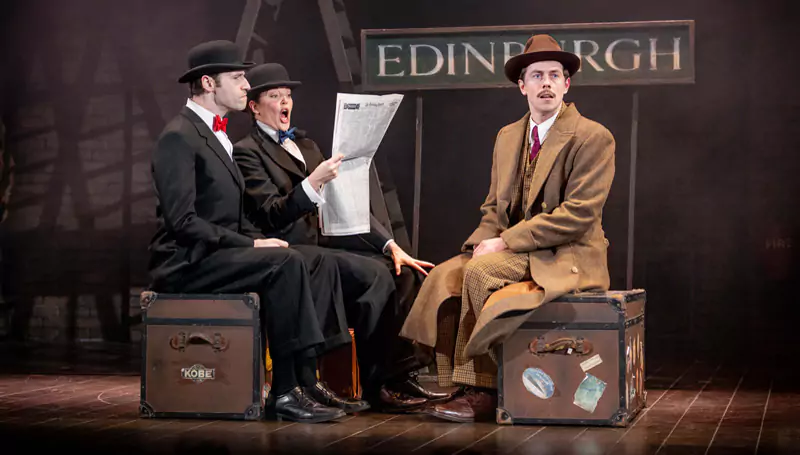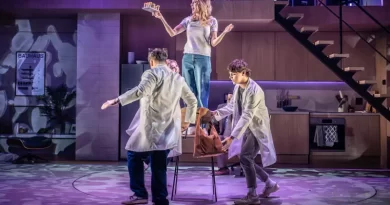“The 39 Steps”, Theatre Royal Brighton
Simon Jenner in East Sussex
18 July 2024
It seems pure Patrick Barlow, but as a programme detail reminds us, in 1996 Simon Corble and Nobby Dixon dramatised a small-cast parody of John Buchan’s elegantly gruff 1915 thriller The 39 Steps. Barlow in rewriting it paid homage through farce. This revival of his 2005 production that ran eight years and toured, is directed by Maria Aitken and tour-directed by Nicola Samer. It arrives at Brighton’s Theatre Royal till July 20th and continues touring.
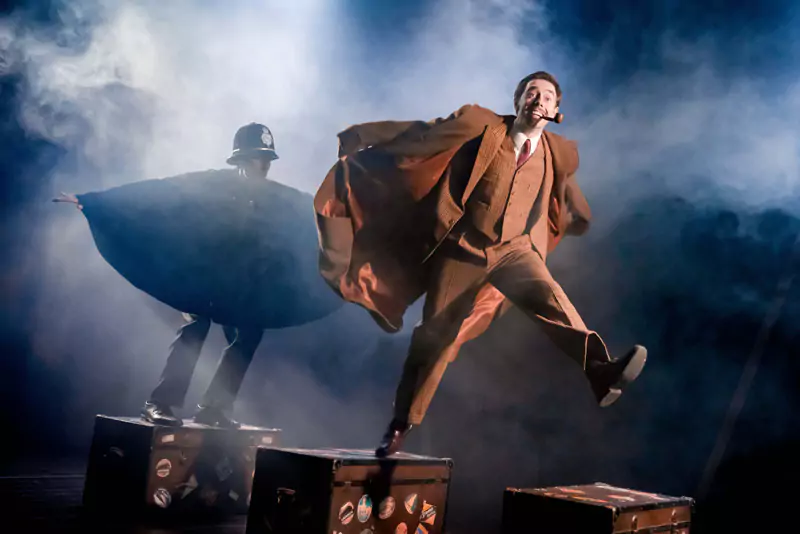
Tom Byrne as Hannay.
Photo credit: Mark Senior.
Though he thought of dramatising the original, Barlow’s version is based on Hitchcock’s 1935 film. Buchan himself preferred Hitch’s often comedic take to his own. He might have enjoyed Barlow’s too. Though Barlow neatly returns to the novel to start Hannay’s narration and deepen him, flecked with the black dog.
Barlow’s adaptation has a cast of four with three multi-roling. Latterly Clown 2 has been taken by a woman, involving gender-role reversals and fluidity, tautening the comedy.
Tom Byrne plays Richard Hannay throughout, the once-bored man on the run for a murder he didn’t commit. Safeena Ladha is first spy Annabella Schmidt, then oppressed young wife Margaret McTyte, finally Pamela Edwards, to whom Hannay is handcuffed, both enjoying an antagonistic mutual attraction. Indeed all three women are attracted. Even the spy prefers bed, certainly to a knife in her back – and that in itself marks a tragic-comic consummation of her desires as she wriggles and expires across his lap: “Oh Richard Hannay!”.
Being re-gendered allows Maddie Rice (Clown 2) the plum of fiendish arch-villain Professor Jordan, a put-upon milkman, truculent lingerie seller (a double-act with Eugene McCoy and samples), policeman, vendor, one of two thugs Jordan dispatches on chases. Rice, known for taking over Fleabag from Phoebe Waller-Bridge and her own award-winning show Pickle Jar followed by Selfish this year, takes a backseat as hotel proprietor silenced by his warm-hearted wife shielding “a runaway couple”: McCoy again, particularly relishing this vignette.
Rice’s Jordan shines in darkness visible: revelling in a villainous double-voice. Barlow’s own addition here, the camp of now explicitly fascist speeches pivots on “I thought briefly you might be one of us” moments. There’s great cockings of guns.
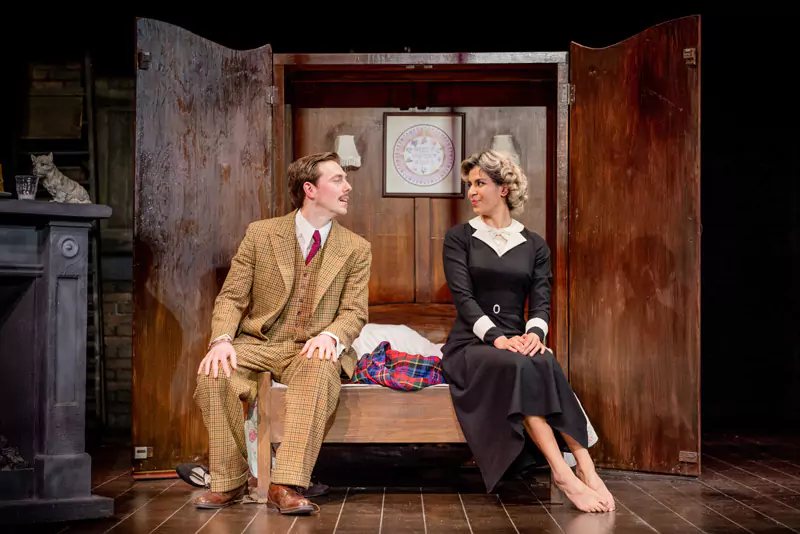
Tom Byrne and Safeena Ladha.
Photo credit: Mark Senior.
Rice elsewhere relishes establishment Scottish Procurator Fiscal, chasing Hannay out of the rear window. Hitchcock jokes abound in Mic Pool’s sound design, including music for that film, North by Northwest for the plane chase and Psycho for a waterfall curtain. For other chases there is Charles Williams’ ‘Devil’s Galop’ used in the early 1950s Dick Barton radio spy series. To heighten the adaptation’s gentle class-ribbing, BBC-style voiceovers have the male announcer melt disclosing Hannay’s charms.
A McCoy highlight is Mr Memory with his virtuoso delivery of a formula. His original on screen is here inflected with a pre-trance state of light bewilderment, aided by McCoy’s MC (Rice) who cannily translates ‘audience’ questions to some measurable fact. McCoy’s Mr Memory frames Hitch’s and Barlow’s vaudevillian world.
McCoy’s McTyte is particularly impressive: a fearsome, mean old crofter, thick with accent. He’s also complacent husband of Jordan, dancing a tango with Rice who is just (apparently) disposed of Hannay. It’s the only disappointment, a lack of a sharp-ending first act. It should goose-step.
Otherwise this is a superb revival, with enhancements: I don’t recall snow falling on the stalls. Ian Scott’s lighting enjoys is crisply fluid; storytelling never seems spot-lit. Movement director Toby Sedgwick produces ballets of physical comedy, with exquisite pratfalls and use of the Clowns as gnarly trunks and rocks, overcome with an occasional kick. The most memorable is Hitchcock’s Pamela removing her stockings. Here, differently, Ladha declines help from Hannay, emphasising period inhibition: it’s still erotically playful.
Peter McKintosh’s set is as deceptively simple as his costumes are tightly period and (for Byrne) tweedy. Emphasis is on the wit of basic means to maximise theatre and laughter, for instance late cues. The theatre’s bare brickwork is invoked, sometimes through thick stage-smoke. Windows frames are held and squeezed through. The Forth Bridge is a miniature gantry. The Palladium in lights resembles this theatre: the set’s own downstage audience boxes twice come into their own. Movables such as beds, Hannay’s apartment, an office desk woosh across (stage managers also take a curtain call). Puppets projected in silhouette (including one of Hitch co-ordinating the chase) reaches an apotheosis as two planes try machine-gunning Hannay and suffer a mishap.
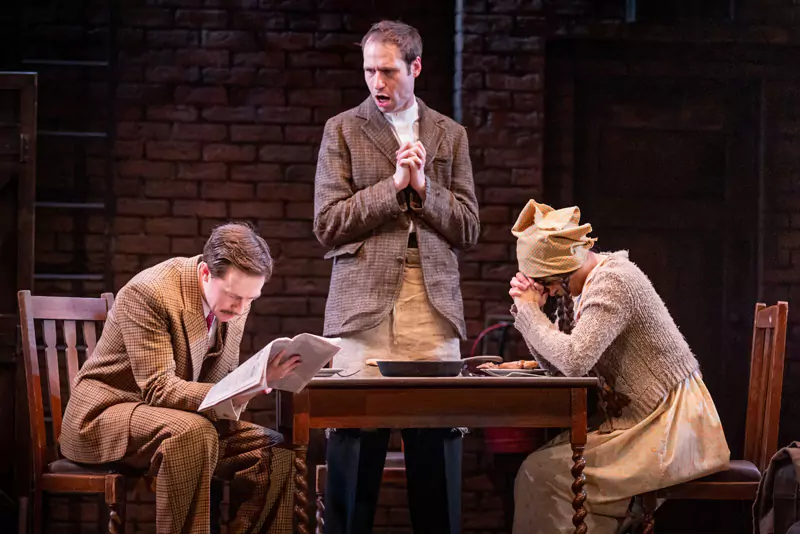
Tom Byrne, Eugene McCoy & Safeena Ladha.
Photo credit: Mark Senior.
Byrne’s Hannay voice recalls Robert Donat’s. The clipped privilege of period heroes contrasts with a gallimaufry of Scottish accents: manners and class assumptions are lightly but sharply pricked throughout. Voice and dialect coach Hugh O’Shea has particular fun with McCoy’s incomprehensibility as a highlander. Byrne’s physicality blades into view and out of it, on a razor of exaggeration and braggadocio, involving stunts. He also gets the comedic edge of “a whole flock of detectives” amusing Ladha’s Pamela despite herself.
Ladha invests three roles with very different qualities. As Annabella Schmidt she is cod-mysterious, deadly serious and slinky foreign seductress, accent thick as Rice’s Jordan, baffled Hannay won’t spend the night with her; and exquisitely timed in her knifed scena, orgasmic and operatic in a dying fall.
As Margaret McTyte, Ladha makes an appealing case for this Glasgow-born woman, barely 20, who hungers for bright lights and travel. Her attraction (nicely rounded off) offsets the bleakness of whatever brought her to an ancient crofter whom Hannay first thinks is her father. Ladha invests her with warmth, decision and pathos.
Finally as Pamela – it transpires a Scot with ruling-class connections – Ladha revels in initial hauteur in the train and later the hustings meeting. Her comedic mix of accusatory outrage and despite herself falling for Hannay’s humour is robust and touchingly self-defeating. As is hesitant tenderness, blasted by Hannay’s fury at her omitting to tell him the villains are gone. It’s Pamela though who first spots the ‘policemen’ are taking the wrong road. Heightening class-parody, Barlow adds mutually hesitant material even after the climax, beyond Hitchcock.
Byrne necessarily crowns this, including a hustings speech for “McCrocodile”. We believe his man of action, snappy, even brusque, easily bored. One wonders when he’ll be drawn out again: Buchan wrote five Hannay novels.
The crack ensemble refresh a frenzied ballet. Aitken and Samer pace Barlow’s own homage with point and pace over 90 minutes. Careful not to guy Hitchcock or Buchan, this remains perhaps the most creative adaptation of any film.

